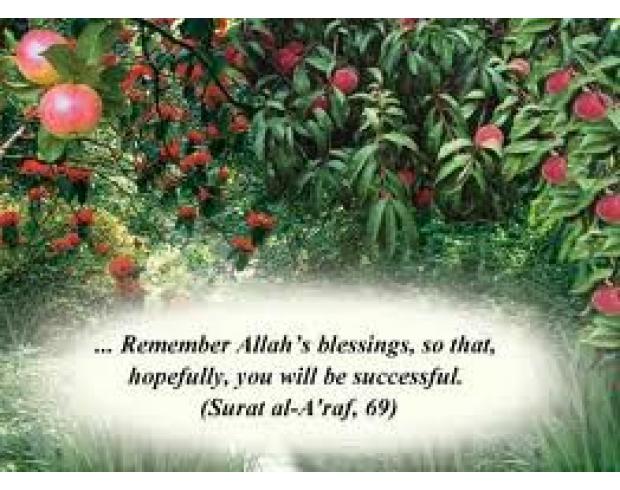is indeed a great sign and example from Allah to see Asiya, one of the most pious person, to be a wife of Pharaoh, the most arrogant man ever created. The story of Asiya becomes even more important and relevant to all Muslims and Islamic history since it is deeply intertwined with the story of a Prophet of Allah. Her life begins to change when she and her husband discovered the basket holding the prophet of Allah, Musa (pbuh) out on the Nile River. The story is related in the Quran as follows: "Behold! We sent to thy mother, by inspiration the message: (38) " `Throw (the child) into the chest and throw (the chest) into the river: the river will cast him up on the bank and he will be taken up by one who is an enemy to Me and an enemy to him': but I cast (the garment of) love over thee from Me: and (this) in order that thou mayest be reared under Mine eye.” (20: 38-39) “So We sent this inspiration to the mother of Moses: "Suckle (thy child) but when thou hast fears about him cast him, into the river, but fear not nor grieve: for We shall restore him to thee, and We shall make him one of Our messengers." (7) Then the people of Pharaoh picked him up (from the river): (it was intended) that (Moses) should be to them an adversary and a cause of sorrow: for Pharaoh and Haman and (all) their hosts were men of sin. (8) The wife of Pharaoh said: "(Here is) a joy of the eye for me and for thee: slay him not. It may be that he will be of use to us, or we may adopt him as a son." And they perceived not (what they were doing)!” (28:7-9) By the will of Allah, Musa was raised in the palace under her watch so he can become the joy to her eyes as she first claimed him to be. There is a great lesson on the words she used when she describe Musa (pbuh). Musa grew up in the palace of Pharaoh and as the story goes he escaped an execution from pharaoh and went to Medyan. After an extended stay in Medyan, it was time for him to return to the land of Egypt to free the children of Israel and warn pharaoh of a great punishment if he does not repent and follow the monotheistic religion, Islam. Allah (SW) guides whom he wants. It was in this process that the greatest women in Islamic history found Islam to be her religion despite the terrifying and frightening methods used by Pharaoh to stop anyone from following Musa (pbuh). This righteous woman began secretly exercising her worship to the one and only God, Allah. And when her husband, found out about her secret and that she was worshiping God other than him, as he was claiming to be one, he began torturing her beyond what a human mind could comprehend. However his torture did not affect her or changed anything but increase her "Iman" faith in Allah. And that made her grow stronger causing Pharaoh o lose hope. In fact, some scholars say that she used to smile and laugh as she was getting tortured. Asiya's strong Iman made Pharaoh more furious and made him decide to issue her death by throwing her with a huge stone, since no other torturing method worked with her. That is when Asiya, May Allah's peace and blessing be upon her, made her famous prayer to Allah as mentioned in the Quran as follows and became an example for the believers until the day she meets Allah. وَضَرَبَ ٱللَّهُ مَثَلاً۬ لِّلَّذِينَ ءَامَنُواْ ٱمۡرَأَتَ فِرۡعَوۡنَ إِذۡ قَالَتۡ رَبِّ ٱبۡنِ لِى عِندَكَ بَيۡتً۬ا فِى ٱلۡجَنَّةِ وَنَجِّنِى مِن فِرۡعَوۡنَ وَعَمَلِهِۦ وَنَجِّنِى مِنَ ٱلۡقَوۡمِ ٱلظَّـٰلِمِينَ 1 – Allaah says (interpretation of the meaning): “And Allaah has set forth an example for those who believe: the wife of Fir’awn (Pharaoh), when she said: ‘My Lord! Build for me a home with You in Paradise, and save me from Fir’awn (Pharaoh) and his work, and save me from the people who are Zaalimoon (polytheists, wrongdoers and disbelievers in Allaah)’” [al-Tahreem 66:11] Even though the translation of this verse to English does not clearly show the difference between asking “to be close” to Allah before the “building of a house”, the Arabic Quran showed that she mentioned “Endeke” or “with You” first before she mentioned the house. This implies she asked for the closeness of Allah for the reason it was very important to her. 2 – It was narrated that Abu Moosa al-Ash’ari said: The Messenger of Allaah (peace and blessings of Allaah be upon him) said: “The men who attain perfection are many, but there are no woman who have attained perfection apart from Aasiyah the wife of Pharaoh and Maryam bint ‘Imraan, and the superiority of ‘Aa’ishah over all other women is like the superiority of thareed over all other foods.” (Narrated by al-Bukhaari, 3230; Muslim, 2431) 3 – It was narrated that Ibn ‘Abbaas said: the Messenger of Allaah (peace and blessings of Allaah be upon him) drew four lines on the ground, then he said, “Do you know what this is?” We said, “Allaah and His Messenger know best.” The Messenger of Allaah (peace and blessings of Allaah be upon him) said: “The best of the women of Paradise are Khadeejah bint Khuwaylid, Faatimah bint Muhammad, Aasiyah bint Mazaahim the wife of Pharaoh, and Maryam bint ‘Imraan – may Allaah be pleased with them.” (Narrated by Ahmad, 2663. Classed as saheeh by al-Albaani in Saheeh al-Jaami’, 1135) 4 – It was narrated from Anas that the Prophet (peace and blessings of Allaah be upon him) said: “Sufficient for you among the women of the world are Maryam the daughter of ‘Imraan. Khadeejah bint Khuwaylid, Faatimah bint Muhammad and Aasiyah the wife of Pharaoh.” (Narrated and classed as saheeh by al-Tirmidhi, 3878) 5 – al-Haafiz ibn Hajar said: Among the virtues of Aasiyah the wife of Pharaoh is that she chose death over royal privilege and torment in this world over the luxury in which she was living. And her insight concerning Moosa (peace be upon him) was correct when she said “A comfort of the eye for me” [al-Qasas 28:9 – interpretation of the meaning]. Fath al-Baari, 6/448 We pray the story of Asiya inspired all of us in to becoming the best Muslims who can be a role model and good example to the generation to come. May Allah grant Asiya her prayer and give us the strength to be like her. Ameen Allaah knows best.
2014-04-18 03:00:33
is indeed
sign in to comment
Be the first to comment





